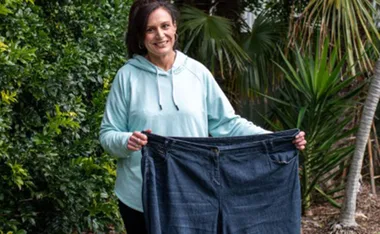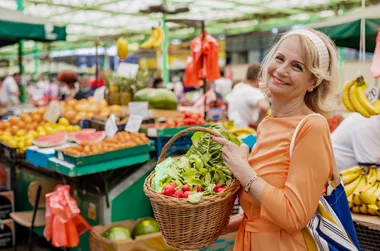Hop online and tap in the words “weight loss diet” and, within seconds, you’ll have thousands of food plans to choose from. Yet food can do so much more than just fill you up and trim you down, says Dr Gio Miletto, co-author of The Food Hospital.
“By choosing our foods carefully, we can have a lot more control than we ever have over how well we age, how we resist illnesses and the number of years we are able to live an active life,” says Dr Miletto.
Colds and Coughs
Winter is the prime time for colds and coughs, but no research has definitively explained exactly why this is.
More than 90 per cent are caused by viruses – there are over 200 that can cause colds – and won’t respond to antibiotics. There are different types of coughs – dry and chesty. Inflammation causes dry coughs and there is phlegm with chesty coughs.
There are several things you can do to help yourself when you’re suffering, some that may reduce the likelihood of you succumbing to any colds and coughs that are doing the rounds in the first place.
Vitamin C
Many people take vitamin C supplements to prevent colds and coughs, but it’s controversial and has been for years. There’s not a lot of solid scientific evidence supporting it. In fact, it’s rather the opposite – studies involving 11,300 people found that taking vitamin C tablets failed to reduce the incidence of colds.
It’s better to get vitamin C from food. Then you get a range of anti-oxidants, not just vitamin C, and vitamins from foods are likely to be easier for the body to access (they are more “bio-available”).
Garlic
Garlic is interesting because a study of 146 people showed that those who ate garlic every day for three months caught fewer colds. If they caught a cold, garlic didn’t reduce the effects, but they weren’t as likely to catch colds in the first place. Garlic has antimicrobial and antiviral properties, so that might be why it works.
Zinc
Several studies indicate that zinc is a factor in both preventing and alleviating colds, but there can be side effects if you take zinc supplements long term. It’s far better to make sure you are eating lots of zinc-containing foods as winter approaches.
Soup
Soup is a good choice when you’ve got a cold. Nutrients from meat, vegetables and pulses are retained in the liquid, and it’s easy to make a decent soup at home.
Hay Fever
Hay fever is an allergic reaction. Your immune system is reacting to the presence of a substance your body has come into contact with and is reacting as though the substance was harmful (even though it isn’t).
Cells in the lining of your nose, eyes and mouth release histamine, which sets off all the symptoms – and your symptoms are the result of your body trying to fight these substances.
Each time you come into contact with them, your body reacts even more, in a process called sensitisation: it has become sensitised to their presence.
Plants are a common trigger, particularly pollen from grass and trees, dust mites are another and so is pet “residue” (saliva and skin). Spores from fungi and mould can also be problematic, but pollen is the big one.
Honey
Some people claim that eating locally produced honey relieves the symptoms of hay fever. There doesn’t seem to be any strong scientific evidence, but there’s anecdotal evidence of positive effects.
Kiwi fruit
Because kiwi fruit is packed with vitamin C and helps to promote your immune system, reducing the impact of hay fever. They also contains bioflavanoids, which are a natural anti-histamine.
Pineapple
Pineapples are rich in bromelain, an enzyme with strong anti-inflammatory affects.
Deterioration of eyesight
The most common cause of deteriorating eyesight is Age-related Macular Degeneration (AMD); cataracts are another. Having lots of good HDL cholesterol reduces your risk of cataracts, while keeping your Body Mass Index (BMI) in a healthy range can help reduce the risk of developing AMD and cataracts.
Cataracts are associated with some of the same risk factors as AMD, in particular, a high intake of saturated fat. Cloudy patches of cataracts can develop on the transparent lens in front of the eye. Light can’t pass through them and, as the cataracts grow, less light gets to the back of the eye. The cloudier the lens, the worse the effect on your sight.
Monosaturated fats
Be sure to get lots of monounsaturated fats, especially Omega-3. These can be found in olive oil, canola oil, peanut oil, safflower oil, sesame oil, avocados, peanut butter, and many nuts and seeds. Fish is also a great source of omega-3. If you don’t like the taste of fish, try taking fish oil supplements.
Polyunsaturated fat
Polyunsaturated can help to protect you from AMD, which can be found in walnuts, canola oil, sunflower seeds, sesame seeds, chia seeds, unsalted peanuts, peanut butter, avocado oil, olive oil, seaweed, sardines, soybeans, tuna, wild salmon, whole grain wheat.
Hangovers
Most people know the symptoms of a hangover – feeling sick, dizzy and headachy, maybe being over-sensitive to light or loud noises, finding it hard to concentrate and even stay upright. And most people know what causes it: too much alcohol.
Alcohol addiction can cause sweating, anxiety, tremors and palpitations, and other side efects of withdrawal.
Water
The best way of dealing with a hangover is to try and drink lots of (non-alcoholic!) fluid before bed.
Gatorade or Powerade
Try a sports drink to rehydrate you. Sports drinks contain lots of electrolytes, which help to rehydrate you faster.
Healthy breakfast
You’ve heard of hair of the dog, and greasy breakfasts being the cure, but instead of something unhealthy, you should be eating something healthy. You need to replace your vitamins. Try eggs on toast, or fruit with yoghurt. Or drag yourself out for a big breakfast at your local cafe.
Headache
There are many kinds of headache. Tension headaches feel like a tight band across the front of your head. Sinus headaches are felt around the eye sockets. Cluster headaches are rarer, though more common in men. These cause a pain behind the eyes, often only one.
Dehydration can be a factor, as can lack of physical activity, smoking, drinking lots of coffee or alcohol and skipping meals. One cause may be sensitivity to artificial ingredients in food or drink, such as the sweetener aspartame.
Water
Headaches are often caused by the meninges in your brain (small blood vessels) constricting or swelling because of dehydration. Replenish them with plenty of water.
Salads
Steer towards meals with a high water content, like lettuce, cucumber, or capsicum. You can eat all of these in one go by adding them to a salad.
Bananas
Bananas are high in magnesium, which can relax the constricting blood vessels, and potassium, which can help with nausea, headaches, and muscle fatigue.
Spicy food
Whether it’s a curry, or a bit of chilli on your meal, eating spicy things can help with your headache. Spicy foods can help with congestion, which will unblock sinuses and reduce pressure, which might be what is causing your headache.
Keep a trigger diary to see if any foods affect you over a couple of weeks. If anything looks likely to be a culprit, cut it out, then reintroduce it later.











